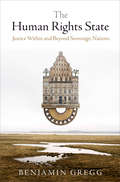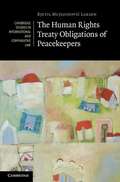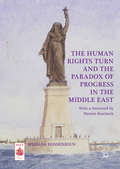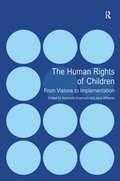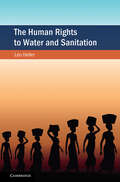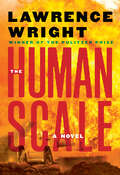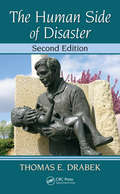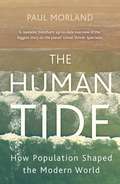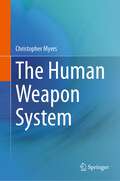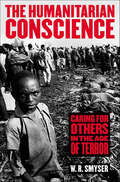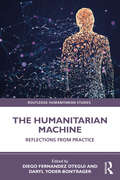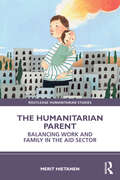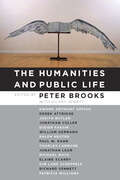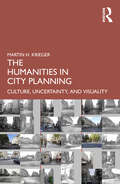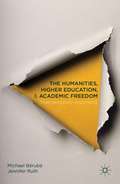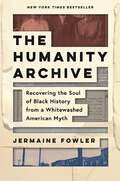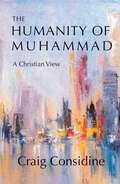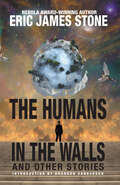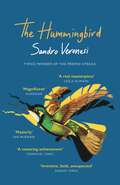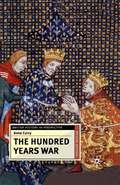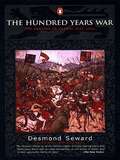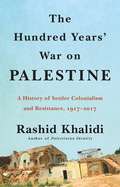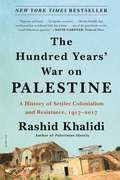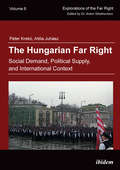- Table View
- List View
The Human Rights State: Justice Within and Beyond Sovereign Nations (Pennsylvania Studies in Human Rights)
by Benjamin GreggThe nation state operates on a logic of exclusion: no state can offer citizenship and legal rights to all comers. From the logic of exclusion a state derives its sovereign power. Yet this exclusivity undermines the project of advancing human rights globally. <P><P>That project operates on a logic of inclusion: all people, regardless of citizenship status or territorial location, would everywhere be recognized as bearers of human rights. In practice, human rights are afforded, if at all, then only to citizens of those few states that sometimes regard human rights as moral necessities of domestic commitments—or for states that find that stance politically expedient for the moment.This discouraging reality in the first decades of the twenty-first century prompts the question: What political arrangement might better conduce the local embrace and enduring practice of human rights? <P><P>In The Human Rights State, Benjamin Gregg challenges the conviction that the nation state can only have a zero-sum relationship with human rights: national sovereignty is possible or human rights are possible, but not both, not in the same place, at the same time. He argues that the human rights project would be more effective if established and enforced at local levels as locally valid norms, and from there encouraged to expand outward toward overlaps with other locally established and enforced conceptions of human rights grown in their own local soils. <P><P>Proposing a metaphorical human rights state that operates within or alongside a nation state, Gregg describes networks of activists that encourage local political and legal systems to generate domestic obligations to enforce human rights. Geographic boundaries and national sovereignties would remain intact but diminished to the extent necessary to extend human rights to all persons, without reservation, across national borders, by rendering human rights an integral aspect of the nation state's constitution.
The Human Rights Treaty Obligations of Peacekeepers
by Kjetil Mujezinović LarsenDo States, through their military forces, have legal obligations under human rights treaties towards the local civilian population during UN-mandated peace operations? It is frequently claimed that it is unrealistic to require compliance with human rights treaties in peace operations and this has led to an unwillingness to hold States accountable for human rights violations. In this book, Kjetil Larsen criticises this position by addressing the arguments against the applicability of human rights treaties and demonstrating that compliance with the treaties is unrealistic only if one takes an 'all or nothing' approach to them. He outlines a coherent and more flexible approach which distinguishes clearly between positive and negative obligations and makes treaty compliance more realistic. His proposals for the application of human rights treaties would also strengthen the legal framework for human rights protection in peace operations without posing any unrealistic obligations on the military forces.
The Human Rights Turn and the Paradox of Progress in the Middle East
by Mishana HosseiniounThis book aims to shift the limited and often negative popular understanding of the Middle East's place in the world by chronicling the region's contributions to the international order rather than disorder, and to the development of the international human rights system. It elucidates the many paradoxes that make the Middle East and North Africa (MENA) region both a troubling place and also a region brimming with great potential for peace, prosperity and progress. By demonstrating the paradox of human rights progress amid regress, the book tells a radically new and more hopeful side of the story of the region that has largely been obfuscated and omitted from the chronicles of history. In so doing, it shows that fostering a human rights culture is not only possible for all universally, it is inevitable.
The Human Rights of Children: From Visions to Implementation
by Antonella InvernizziThis volume provides a series of critical analyses of some of the contemporary debates in relation to the human rights of children, resituating them within visions which informed the text of the United Nations Convention on the Rights of the Child in 1989. The studies embrace examination of some of today's widespread interpretations of the CRC, analysis of what is implied by a human rights-based approach in research and advocacy and consideration of advances and barriers to research and to several aspects of CRC implementation. With contributions by leading experts in the field, the book examines the CRC as an international instrument, its inherent dilemmas and some of the debates generated by the challenges of implementation. It embraces examinations of different levels of governance from the international to the state party, regional and local levels, including institutional developments and changes in law, policy and practice. The book will be a valuable resource for students, researchers and policy-makers working in the area of children's rights and welfare.
The Human Rights to Water and Sanitation (Cambridge Studies on Environment, Energy and Natural Resources Governance)
by Léo HellerThis analysis of the human rights to safe drinking water and sanitation (HRtWS) uncovers why some groups around the world are still excluded from these rights. Léo Heller, former United Nations Special Rapporteur on the human rights to water and sanitation, draws on his own research in nine countries and reviews the theoretical, legal, and political issues involved. The first part presents the origins of the HRtWS, their legal and normative meanings and the debates surrounding them. Part II discusses the drivers, mainly external to the water and sanitation sector, that shape public policies and explain why individuals and groups are included in or excluded from access to services. In Part III, public policies guided by the realization of HRtWS are addressed. Part IV highlights populations and spheres of living that have been particularly neglected in efforts to promote access to services.
The Human Rights-Based Approach to Carbon Finance
by Damilola S. OlawuyiThis book analyses the topical and contentious issue of the human rights impacts associated with carbon projects, especially in developing countries. It outlines a human rights-based approach to carbon finance as a functional framework for mainstreaming human rights into the design, approval, finance and implementation of carbon projects. It also describes the nature and scope of carbon projects, the available legal options for their financing and the key human rights issues at stake in their planning and execution. Written in a user-friendly style, the proposal for a rights-based due diligence framework through which human rights issues can be anticipated and addressed makes this book relevant to all stakeholders in carbon, energy, and environmental investments and projects.
The Human Scale: A Novel
by Lawrence WrightIn this sweeping, timely thriller, a Palestinian American FBI agent teams up with a hardline Israeli cop to solve the murder of the Israeli police chief in Gaza—from the Pulitzer Prize–winning author of The Looming Tower and The End of October."A layered tale of intrigue and betrayal."—Geraldine Brooks, Pulitzer Prize-winning author of March and HorseTony Malik, a half-Irish, half-Arab FBI agent based in New York, specializes in tracking money from drug and arms deals. His life takes a dramatic turn when a long-term relationship ends and his job hangs in the balance. Amid personal turmoil, Malik becomes intrigued by his Palestinian father's past. He decides to visit his ancestral homeland for his niece's wedding, accepting a seemingly simple FBI assignment along the way.Upon arrival in the West Bank, Malik's world is upended when the Israeli police chief is murdered. Initially a suspect, Malik's investigative prowess soon earns him a place in the Israeli investigation. At the heart of the story is Malik's complex relationship with Yossi, the hardline anti-Arab Israeli police officer leading the case. They must learn to trust each other because, as they move closer to solving the case, they realize there is no one else they can trust on either side.Lawrence Wright populates the novel with richly drawn characters: Yossi's daughter studying in Paris, Malik's niece whose wedding is shattered by violence, her peacenik fiancé with ties to Hamas, and a cast of religious leaders, corrupt cops, and militants on both sides. Through these intersecting lives, Wright weaves an intricate tapestry that culminates in the devastating Hamas attack on Israel on October 7, 2023.More than a thriller, Wright's novel explores the complex history between Israel and Palestine, revealing the tragic human scale of this long-standing conflict and offering a nuanced perspective on a tragedy that continues to shape the region and the world.
The Human Side of Disaster
by Thomas E. DrabekSince the first edition of The Human Side of Disaster was published in 2009, new catastrophes have plagued the globe, including earthquakes in Haiti and New Zealand, tornadoes in Alabama and Missouri, floods in numerous locations, Hurricane Sandy, and the infamous BP oil spill. Enhanced with new cases and real-world examples, The Human Side of Disaster, Second Edition presents an updated summary of the social science knowledge base of human responses to disaster. Dr. Drabek draws upon his 40-plus years of conducting research on individual, group, and organizational responses to disaster to illustrate and integrate key insights from the social sciences to teach us how to anticipate human behaviors in crisis. The book begins with a series of original short stories rooted within actual disaster events. These stories are woven into the entire text to demonstrate essential findings from the research literature. Dr. Drabek provides an overview of the range of disasters and hazards confronting the public and an explanation of why these are increasing each year, both in number and scope of impact. The core of the book is a summary of key findings regarding disaster warning responses, evacuation behavior, initial post-impact survival behavior, traditional and emergent roles of volunteers, and both short-term and longer-term disaster impacts. The theme of "organized-disorganization" is used to illustrate multiorganizational response networks that form the key managerial task for local emergency managers. The final chapter provides a new vision for the emergency management profession—one that reflects a more strategic approach wherein disasters are viewed as non-routine social problems. This book will continue to be an invaluable reference for professionals and students in emergency management and public policy and aid organizations who need to understand human behavior and how best to communicate and work with the public in disaster situations.
The Human Tide: How Population Shaped the Modern World
by Paul Morland'Superbly explained' Washington PostEvery phase since the advent of the industrial revolution - from the fate of the British Empire, to the global challenges from Germany, Japan and Russia, to America's emergence as a sole superpower, to the Arab Spring, to the long-term decline of economic growth that started with Japan and has now spread to Europe, to China's meteoric economy, to Brexit and the presidency of Donald Trump - can be explained better when we appreciate the meaning of demographic change across the world.The Human Tide is the first popular history book to redress the underestimated influence of population as a crucial factor in almost all of the major global shifts and events of the last two centuries - revealing how such events are connected by the invisible mutually catalysing forces of population.This highly original history offers a brilliant and simple unifying theory for our understanding the last two hundred years: the power of sheer numbers. An ambitious, original, magisterial history of modernity, it taps into prominent preoccupations of our day and will transform our perception of history for many years to come.
The Human Weapon System
by Christopher MyersThis book discusses the differences between a human weapon system and a tactical athlete and what a human optimization program is. Furthermore, this book discusses and demonstrates how to put together a training program at an organizational level for the human weapon system. A systematic approach is presented and discussed, from initial analysis of the human weapon system to creating a multi-domain human performance optimization program. This book strives to familiarize the reader with the systematic approach that the author has utilized as an exercise physiologist in the Department of Defence over the past ten years. This book also explains how to utilize technology to individualize the human performance optimization program at an organizational level. The book discusses current technologies in power generation, measuring endurance, and nutrition, and also demonstrates to strength coaches and practitioners how to use these technologies and individualize optimization.
The Humanitarian Conscience: Caring for Others in the Age of Terror
by W. R. SmyserHumanitarian action, long dismissed as a realm apart from major foreign policy concerns, has become an omnipresent element in international affairs. It now shapes the world in which we live and it will have increasingly imporant impact on the way decisions are made in international crises. W.R. Smyser looks at the history of humanitarian activity and it's growth since the horrors of WWII were made public, tracing its early stages connected to the creation of the Universal Declaration of Human Rights to the present day when human rights groups, such as Human Rights Watch, are as influential as modern nation states in influencing the course of internation events. This is a monumental portrait of the way in which individuals who are not officially part of any government work to alleviate human suffering and physical destruction around the world.
The Humanitarian Machine: Reflections from Practice (Routledge Humanitarian Studies)
by Diego Fernandez OteguiAs the world reels from the impact of a global pandemic and increasing intensity of climate-caused hazards, the humanitarian sector has never been more relevant. But providing aid to those affected by disasters and crises is more complex than ever. In The Humanitarian Machine aid workers reflect on their own experiences of working in crisis. As they write about their work and the ways in which they each approach the challenges of helping people, they comment on some of the most vexing issues facing the humanitarian sector. Each speaks from their own perspective, asking tough questions, sharing thoughtful reflections about their ongoing work, and unpacking what it really means to be a humanitarian worker. The stories they tell, whether recounting a specific experience or reflecting on years of practice, reveal the dilemmas they face and demystify the overly romanticized aura that sometimes surrounds humanitarian practice. Complementing the candid accounts that humanitarian leaders contribute in this book, the editors examine how their stories, perceptions, and understandings align with similar conversations that take place in other settings. Viewed together in this way, the insights and reflections provided in this book will be invaluable for humanitarian practitioners, students, and researchers alike.
The Humanitarian Parent: Balancing Work and Family in the Aid Sector (Routledge Humanitarian Studies)
by Merit HietanenAid sector staff work in some of the world’s most challenging environments, from conflict zones to sites of natural disaster and refugee camps. For a long time, the aid worker was typified by the lone white male, flying from place to place and seeing his family during the holidays. But now, as the world changes and the sector diversifies, how can family life be reconciled with the challenges and travel commitments of this particularly difficult career? This book delves deep into these challenges, exposing the problems that persist and pointing a path for organisations to adopt a more human-centred, staff-centred, parent-centred, feminist approach to humanitarian and development work. Drawing on the author’s own experiences as an aid worker, as well as extensive original interviews and desk research, the book looks at the challenges faced by those who aspire to a family life, from finding a partner who is willing and able to live in the same location, to dating in difficult contexts, to being away from home and extended family, finding child care, and settling children in new countries and cultures. Local workers face their own challenges, often suffering from a lack of support in comparison to their international colleagues. For many, the cost is too great, and the sector suffers from a brain drain as experienced staff leave. It doesn’t need to be this way. The book points a way for organisations to adopt policies that support mothers and fathers. As well as being a useful guide for aid professionals who are themselves navigating these issues, the book will be perfect for organisations looking to reform and for students wishing to understand the realities of a career in aid.
The Humanities and Public Life
by Peter BrooksThis book tests the proposition that the humanities can, and at their best do, represent a commitment to ethical reading. And that this commitment, and the training and discipline of close reading that underlie it, represent something that the humanities need to bring to other fields: to professional training and to public life.What leverage does reading, of the attentive sort practiced in the interpretive humanities, give you on life? Does such reading represent or produce an ethics? The question was posed for many in the humanities by the “Torture Memos” released by the Justice Department a few years ago, presenting arguments that justified the use of torture by the U.S. government with the most twisted, ingenious, perverse, and unethical interpretation of legal texts. No one trained in the rigorous analysis of poetry could possibly engage in such bad-faith interpretation without professional conscience intervening to say: This is not possible.Teaching the humanities appears to many to be an increasingly disempowered profession—and status—within American culture. Yet training in the ability to read critically the messages with which society, politics, and culture bombard us may be more necessary than ever in a world in which the manipulation of minds and heartsis more and more what running the world is all about.This volume brings together a group of distinguished scholars and intellectuals to debate the public role and importance of the humanities. Their exchange suggests that Shelley was not wrong to insist that poets are the unacknowledged legislators of mankind: Cultural change carries everything in its wake. The attentive interpretive reading practiced in the humanities ought to be an export commodity to other fields and to take its place in the public sphere.
The Humanities in City Planning: Culture, Uncertainty, and Visuality
by Martin KriegerThis book by preeminent planning theorist Martin H. Krieger explores how cities are much more than their economies, demographies, or geographies. Planning today is dominated by social science, but Kreiger takes a different approach, thinking of city planning in terms of Culture, Uncertainty, and Visuality. The chapters explore planners and their role as protagonist in the humanities of literature and history; the inevitability of uncertainty in planning and how to face it; and how to attend to the physical, visual, and aural environment of the city. Through a series of essays, Krieger shows that cities are cultural and meaningful, that they are contingent and so filled with opportunity, and that they are concrete, particular, and encountered. The Humanities in City Planning will be of interest to students and scholars of the humanities and planning looking for alternative ways of viewing the city.
The Humanities, Higher Education, and Academic Freedom: Three Necessary Arguments
by Michael Bérubé Jennifer RuthThis book is a lively, passionate defence of contemporary work in the humanities, and, beyond that, of the university system that makes such work possible. The book's stark accounts of academic labour, and its proposals for reform of the tenure system, are novel, controversial, timely, and very necessary.
The Humanity Archive: Recovering the Soul of Black History from a Whitewashed American Myth
by Jermaine FowlerThis sweeping survey of Black history shows how Black humanity has been erased and how its recovery can save the humanity of us all.Using history as a foundation, The Humanity Archive uses storytelling techniques to make history come alive and uncover the truth behind America's whitewashed history. The Humanity Archive focuses on the overlooked narratives in the pages of the past. Challenging dominant perspectives, author Jermaine Fowler goes outside the textbooks to find recognizably human stories. Connecting current issues with the heroic struggles of those who have come before us, Fowler brings hidden history to light. Praise for The Humanity Archive: From the African Slave Trade to Seneca Village to Biddy Mason and more, The Humanity Archive is a very enriching read on the history of Blackness around the world. I was hooked by Fowler's storytelling and would recommend others who want to pore over a book that outlines critical moments in history—without putting you to sleep. — Philip Lewis, Senior Editor, HuffPost Fowler sees historical storytelling and the sharing of knowledge as a vocation and a means of fostering empathy and understanding between cultures. A deft storyteller with a sonorous voice, Fowler's passion for his material is palpable as he unfurls the hidden histories. — Vanity Fair Born in Louisville, Kentucky, Jermaine Fowler is a storyteller and self-proclaimed intellectual adventurer who spent his youth seeking knowledge on the shelves of his local free public library. Between research and lecturing, he is the host of the top-rated history podcast, The Humanity Archive, praised as a must-listen by Vanity Fair. Challenging dominant perspectives, Fowler goes outside the textbooks to find recognizably human stories. Connecting current issues with the heroic struggles of those who've come before us, he brings hidden history to light and makes it powerfully relevant.
The Humanity of Muhammad: A Christian View
by Craig ConsidineWhat makes an American Catholic of Irish and Italian descent one of the leading global voices in admiration of Prophet Muhammad? In this overview of Muhammad's life and legacy, prominent scholar Craig Considine provides a sociological analysis of Muhammad's teachings and example. Considine shows how the Prophet embraced religious pluralism, envisioned a civic nation, stood for anti-racism, advocated for seeking knowledge, initiated women's rights, and followed the Golden Rule. Considine sheds light on the side of Prophet Muhammad that is often forgotten in mainstream depictions and media narratives. The Humanity of Muhammad is Considine's contribution to the growing body of literature on one of history's most important human beings.
The Humans in the Walls: And Other Stories
by Eric James StoneNebula Award-winning author!Supernatural beings, uploaded brains, psychic powers, space colonies, alternate timelines, aliens, superheroes, and giant AI starships that pay little attention to The Humans in the Walls.Each story contains special commentary by the author.
The Hummingbird: ‘Magnificent’ (Guardian)
by Sandro VeronesiA BOOK OF THE YEAR FOR THE GUARDIAN: 'DEEPLY PLEASURABLE'A BOOK OF THE YEAR FOR THE SPECTATOR: 'WHAT A JOY''Magnificent' Guardian'A towering achivement' Financial Times'Inventive, bold, unexpected' Sunday Times'Everything that makes the novel worthwhile and engaging is here: warmth, wit, intelligence, love, death, high seriousness, low comedy, philosophy, subtle personal relationships and the complex interior life of human beings'Guardian'Not since William Boyd's Any Human Heart has a novel captured the feast and famine nature of a single life with such invention and tenderness'Financial Times'There is a pleasing sense of having grappled with the real stuff of life: loss, grief, love, desire, pain, uncertainty, confusion, joy, despair - all while having fun'The Sunday Times'Instantly immersive, playfully inventive, effortlessly wise'Observer'Masterly: a cabinet of curiosities and delights, packed with small wonders'Ian McEwan'A real masterpiece. A funny, touching, profound book that made me cry like a little girl on the last page'Leïla Slimani'A remarkable accomplishment, a true gift to the world'Michael Cunningham'Ardent, gripping, and inventive to the core'Jhumpa LahiriMarco Carrera is 'the hummingbird,' a man with the almost supernatural ability to stay still as the world around him continues to change.As he navigates the challenges of life - confronting the death of his sister and the absence of his brother; taking care of his parents as they approach the end of their lives; raising his granddaughter when her mother, Marco's own child, can no longer be there for her; coming to terms with his love for the enigmatic Luisa - Marco Carrera comes to represent the quiet heroism that pervades so much of our everyday existence.A thrilling novel about the need to look to the future with hope and live with intensity to the very end.THE NO. 1 INTERNATIONAL BESTSELLEROver 300,000 copies soldSoon to be a major motion pictureWinner of the Premio StregaWinner of the Prix du Livre EtrangerBook of the Year for the Corriere della Sera
The Hundred Years War
by Anne CurryAlthough the term 'Hundred Years War' was not coined until the 1860s, the Anglo-French conflicts of the later Middle Ages have long been of interest to historians. A fundamental question remains - was this a feudal war fought over ancient English rights in Gascony, or was it a dynastic war in which English kings battled for the crown of France itself? This book, now fully revised and updated to take account of the latest scholarship, examines the origins and phases of the war and explores the trends in historical opinion from the fourteenth century to the present day. Anne Curry provides a straightforward narrative of English involvement in France, placing the well known military events in their diplomatic context. By focusing on the treaties of 1259, 1360 and 1420, Curry argues that there was not one 'hundred year war' but rather three separate yet linked conflicts, all with significant implications for the European scene as a whole, and for Anglo-French relations in the centuries to come.
The Hundred Years War
by Desmond SewardFrom 1337 to 1453 England repeatedly invaded France on the pretext that her kings had a right to the French throne. Though it was a small, poor country, England for most of those "hundred years" won the battles, sacked the towns and castles, and dominated the war. The protagonists of the Hundred Years War are among the most colorful in European history: Edward III, the Black Prince; Henry V, who was later immortalized by Shakespeare; the splendid but inept John II, who died a prisoner in London; Charles V, who very nearly overcame England; and the enigmatic Charles VII, who at last drove the English out. Desmond Seward's critically-acclaimed account of the Hundred Years War brings to life all of the intrigue, beauty, and royal to-the-death-fighting of that legendary century-long conflict. .
The Hundred Years' War On Palestine: A History of Settler Colonialism and Resistance, 1917-2017
by Rashid KhalidiIn 1899, Yusuf Diya al-Khalidi, former mayor of Jerusalem, alarmed by the Zionist call to transform Palestine into a jewish state, wrote a letter aimed at Theodor Herzl: the country had an indigenous people who would not easily accept their own displacement. He warned of the perils ahead, ending his note, "In the name of God, let Palestine be left alone." Thus Rashid Khalidi, al-Khalidi's great-great-nephew, begins this sweeping history, the first general account of the conflict told from an explicitly Palestinian perspective. Accepted interpretations of the conflict tend, at best, to describe a tragic clash between two peoples with claims to the same land. Drawing on archival materials and the reports of generations of family members--judges, scholars, diplomats, and writers--who were present at key events, The Hundred Years ' War on Palestine instead shows this war has always been colonial in nature, waged against the native population first by the Zionist movement and then by Israel, but backed by Britain and the United States, the great powers of the age. Khalidi highlights crucial episodes in this long colonial campaign, from the Balfour Declaration in 1917 to the destruction of Palestine in 1948, from the war of 1967 to Israel's recent assaults on Gaza. The Hundred Years' War on Palestine is not a chronicle of victimization, nor does it whitewash the mistakes of Palestinian leaders or deny the emergence of national movements on both sides. In this lively, original, and important history, Khalidi points to the resistance of Palestinians in the face of the heaviest of odds and offers an illuminating new view of a conflict that continues to this day. Rashid Khalidi is the author of seven books about the Middle East, among them the award-winning Palestinian Identity, Brokers of Deceit, and The Iron Cage. His writing has appeared in the New York Times, Boston Globe, Los Angeles Times, Chicago Tribune, and many other publications. He is the Edward Sa'id Professor of Modern Arab Studies at Columbia University in New York and coeditor of the Journal of Palestine Studies.
The Hundred Years' War on Palestine: A History of Settler Colonialism and Resistance, 1917–2017
by Rashid KhalidiA landmark history of one hundred years of war waged against the Palestinians from the foremost US historian of the Middle East, told through pivotal events and family historyIn 1899, Yusuf Diya al-Khalidi, mayor of Jerusalem, alarmed by the Zionist call to create a Jewish national home in Palestine, wrote a letter aimed at Theodore Herzl: the country had an indigenous people who would not easily accept their own displacement. He warned of the perils ahead, ending his note, “in the name of God, let Palestine be left alone.” Thus Rashid Khalidi, al-Khalidi’s great-great-nephew, begins this sweeping history, the first general account of the conflict told from an explicitly Palestinian perspective.Drawing on a wealth of untapped archival materials and the reports of generations of family members—mayors, judges, scholars, diplomats, and journalists—The Hundred Years' War on Palestine upends accepted interpretations of the conflict, which tend, at best, to describe a tragic clash between two peoples with claims to the same territory. Instead, Khalidi traces a hundred years of colonial war on the Palestinians, waged first by the Zionist movement and then Israel, but backed by Britain and the United States, the great powers of the age. He highlights the key episodes in this colonial campaign, from the 1917 Balfour Declaration to the destruction of Palestine in 1948, from Israel’s 1982 invasion of Lebanon to the endless and futile peace process. Original, authoritative, and important, The Hundred Years' War on Palestine is not a chronicle of victimization, nor does it whitewash the mistakes of Palestinian leaders or deny the emergence of national movements on both sides. In reevaluating the forces arrayed against the Palestinians, it offers an illuminating new view of a conflict that continues to this day.
The Hungarian Far Right: Social Demand, Political Supply, and International Context (Explorations of the Far Right #6)
by Péter Krekó Attila JuhászThis timely book examines far-right politics in Hungary—but its relevance points much beyond Hungary. With its two main players, the radical right Jobbik and populist right Fidesz, it is at the same time an Eastern European, European, and global phenomenon. Jobbik and Fidesz, political parties with a populist, nativist, authoritarian approach, Eastern and pro-Russian orientation, and strong anti-Western stance, are on the one hand products of the problematic transformation period that is typical for post-communist countries. But they are products of a "populist zeitgeist" in the West as well, with declining trust in representative democratic and supranational institutions, politicians, experts, and the mainstream media. The rise of politicians such as Nigel Farage in the U.K., Marine Le Pen in France, Norbert Hofer in Austria, and, most notably, Donald Trump in the U.S. are clear indications of this trend.In this book, the story of Jobbik (and Fidesz), contemporary players of the Hungarian radical right scene, are not treated as separate case studies, but as representatives of broader international political trends. Far-right parties such as Jobbik (and increasingly Fidesz) are not pathologic and extraordinary, but exaggerated, seemingly pathological manifestations of normal, mainstream politics. The radical right is not the opposite and denial of the mainstream, but the sharp caricature of the changing national, and often international mainstream.
